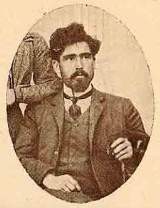
Hristo Batandzhiev
Encyclopedia
Hristo Batandzhiev was a revolutionary, one of the founders of "The Committee for Obtaining the Political Rights Given to Macedonia by the Congress of Berlin" from which, later developed the IMRO known prior to 1902 as Bulgarian Macedonian-Adrianople Revolutionary Committees (BMARC). He is considered Bulgarian
in Bulgaria
and ethnic Macedonian
in the Republic of Macedonia.
He was a teacher in the Bulgarian Exarchate
school in Thessaloniki
and Secretary of the Bulgarian Bishopric in the city between 1888 and 1911. Batandzhiev also participated in the Ilinden-Preobrazhenie Uprising
. After the Young Turk Revolution
from 1908, he was an active member of the Bulgarian Constitutional Clubs
Party.
In July 1913, after the outbreak of the Second Balkan War
, Hristo Batandzhiev was arrested by the Greek authorities. He was about to be deported to the island of Trikeri
in the Aegean Sea
, together with many other Bulgarians. During the trip however, he, the Bulgarian Archimandrite Еvlogi and many others were left in the open sea and drowned.
Bulgarians
The Bulgarians are a South Slavic nation and ethnic group native to Bulgaria and neighbouring regions. Emigration has resulted in immigrant communities in a number of other countries.-History and ethnogenesis:...
in Bulgaria
Bulgaria
Bulgaria , officially the Republic of Bulgaria , is a parliamentary democracy within a unitary constitutional republic in Southeast Europe. The country borders Romania to the north, Serbia and Macedonia to the west, Greece and Turkey to the south, as well as the Black Sea to the east...
and ethnic Macedonian
Macedonians (ethnic group)
The Macedonians also referred to as Macedonian Slavs: "... the term Slavomacedonian was introduced and was accepted by the community itself, which at the time had a much more widespread non-Greek Macedonian ethnic consciousness...
in the Republic of Macedonia.
He was a teacher in the Bulgarian Exarchate
Bulgarian Exarchate
The Bulgarian Exarchate was the official name of the Bulgarian Orthodox Church before its autocephaly was recognized by the Ecumenical See in 1945 and the Bulgarian Patriarchate was restored in 1953....
school in Thessaloniki
Thessaloniki
Thessaloniki , historically also known as Thessalonica, Salonika or Salonica, is the second-largest city in Greece and the capital of the region of Central Macedonia as well as the capital of the Decentralized Administration of Macedonia and Thrace...
and Secretary of the Bulgarian Bishopric in the city between 1888 and 1911. Batandzhiev also participated in the Ilinden-Preobrazhenie Uprising
Ilinden-Preobrazhenie Uprising
The Ilinden–Preobrazhenie Uprising or simply the Ilinden Uprising of August 1903 |Macedonia]] affected most of the central and southwestern parts of the Monastir Vilayet receiving the support mainly of the local Bulgarian peasants and to some extent of the Aromanian population of the region...
. After the Young Turk Revolution
Young Turk Revolution
The Young Turk Revolution of 1908 reversed the suspension of the Ottoman parliament by Sultan Abdul Hamid II, marking the onset of the Second Constitutional Era...
from 1908, he was an active member of the Bulgarian Constitutional Clubs
Bulgarian Constitutional Clubs
Bulgarian Constitutional Clubs was an ethnic Bulgarian political party in the Ottoman Empire, created after the Young Turk Revolution, by members of the Internal Macedonian Adrianople Revolutionary Organization. The party functioned for a little over a year - from September 1908 until November 1909...
Party.
In July 1913, after the outbreak of the Second Balkan War
Second Balkan War
The Second Balkan War was a conflict which broke out when Bulgaria, dissatisfied with its share of the spoils of the First Balkan War, attacked its former allies, Serbia and Greece, on 29 June 1913. Bulgaria had a prewar agreement about the division of region of Macedonia...
, Hristo Batandzhiev was arrested by the Greek authorities. He was about to be deported to the island of Trikeri
Trikeri
Trikeri is a town and a former community in Magnesia, Thessaly, Greece. Since the 2011 local government reform it is part of the municipality South Pelion, of which it is a municipal unit. It lies at the westernmost point of the hook-like Pelion Peninsula on the Pagasetic Gulf. It also includes...
in the Aegean Sea
Aegean Sea
The Aegean Sea[p] is an elongated embayment of the Mediterranean Sea located between the southern Balkan and Anatolian peninsulas, i.e., between the mainlands of Greece and Turkey. In the north, it is connected to the Marmara Sea and Black Sea by the Dardanelles and Bosporus...
, together with many other Bulgarians. During the trip however, he, the Bulgarian Archimandrite Еvlogi and many others were left in the open sea and drowned.
Sources
- Encyclopedia "Bulgaria", vol. 1, Publishing House of the Bulgarian Academy of Sciences, Sofia, 1978 (in BulgarianBulgarian languageBulgarian is an Indo-European language, a member of the Slavic linguistic group.Bulgarian, along with the closely related Macedonian language, demonstrates several linguistic characteristics that set it apart from all other Slavic languages such as the elimination of case declension, the...
): Енциклопедия България, том 1, Издателство на БАН, София, 1978).

